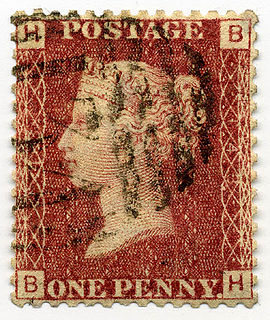This article may rely excessively on sources too closely associated with the subject, potentially preventing the article from being verifiable and neutral.(February 2014) (Learn how and when to remove this template message) |

The Forschungs- und Arbeitsgemeinschaft Irland (FAI – Research and Study Group on Irish Philately) is a registered society, a member of the Bund Deutscher Philatelisten (Association of German Philatelists), and is engaged in Irish philately. The FAI was founded on 24 July 1982 by Frank Holzmüller in order to establish a platform for research and communication for all those interested in Irish philately in the German Federal Republic. [1] Since then the society has become international. The more than 200 members (by 2013) come from four continents and the majority not from Germany. Heinz-Jürgen Kumpf has been President of the FAI since May 2007. [2]

Ireland, also known as the Republic of Ireland, is a country in north-western Europe occupying 26 of 32 counties of the island of Ireland. The capital and largest city is Dublin, which is located on the eastern part of the island, and whose metropolitan area is home to around a third of the country's over 4.8 million inhabitants. The sovereign state shares its only land border with Northern Ireland, a part of the United Kingdom. It is otherwise surrounded by the Atlantic Ocean, with the Celtic Sea to the south, St George's Channel to the south-east, and the Irish Sea to the east. It is a unitary, parliamentary republic. The legislature, the Oireachtas, consists of a lower house, Dáil Éireann, an upper house, Seanad Éireann, and an elected President who serves as the largely ceremonial head of state, but with some important powers and duties. The head of government is the Taoiseach, who is elected by the Dáil and appointed by the President; the Taoiseach in turn appoints other government ministers.

Philately is the study of stamps and postal history and other related items. It also refers to the collection, appreciation and research activities on stamps and other philatelic products. Philately involves more than just stamp collecting, which does not necessarily involve the study of stamps. It is possible to be a philatelist without owning any stamps. For instance, the stamps being studied may be very rare, or reside only in museums.
Contents
The FAI keeps in touch with the other philatelic Ireland societies all over the world and cooperates with the Irish postal administration An Post. The members meet regularly at regional meetings and the Annual General Meeting, which take place in all parts of Germany.

An Post is the state-owned provider of postal services in the Republic of Ireland. An Post provides a "universal postal service" to all parts of the country as a member of the Universal Postal Union. Services provided include, letter post, parcel service, deposit accounts, 'Express Post', an all-Ireland next-day delivery service, and EMS, the international express-mail service.
The society publishes the members’ magazine Die Harfe (The Harp) three times per year. All aspects of Irish philately are treated in more than 200 pages annually. The first 30 volumes are also available digitally, on DVD or USB flash drive. [3] In particular, the magazine deals with Irish postal history. It encompasses, among others, old postal routes, the transport of mail on board overseas steamboats, national and international postal fees, and the Maltese Cross postmarks used in Ireland. Documentation of the postal history of the Irish independence movement is also an important field. Furthermore, the FAI researches the use of postmark machines, military postal history, postal censorship and post from prisoners of war, Irish postal stationery, international reply coupons, and revenue stamps.

A USB flash drive, also known as a thumb drive, pen drive, gig stick, flash stick, jump drive, disk key, disk on key, flash-drive, memory stick, USB key, USB stick or USB memory, is a data storage device that includes flash memory with an integrated USB interface. It is typically removable, rewritable and much smaller than an optical disc. Most weigh less than 1 oz. Since first appearing on the market in late 2000, as with virtually all other computer memory devices, storage capacities have risen while prices have dropped. As of March 2016, flash drives with anywhere from 8 to 256 GB were frequently sold, while 512 GB and 1 TB units were less frequent. As of 2018, 2TB flash drives were the largest available in terms of storage capacity. Some allow up to 100,000 write/erase cycles, depending on the exact type of memory chip used, and are thought to last between 10 and 100 years under normal circumstances.

Postal history is the study of postal systems and how they operate and, or, the study of the use of postage stamps and covers and associated postal artifacts illustrating historical episodes in the development of postal systems. The term is attributed to Robson Lowe, a professional philatelist, stamp dealer and stamp auctioneer, who made the first organised study of the subject in the 1930s and described philatelists as "students of science", but postal historians as "students of humanity". More precisely, philatelists describe postal history as the study of rates, routes, markings, and means.

A steamship, often referred to as a steamer, is a type of steam powered vessel, typically ocean-faring and seaworthy, that is propelled by one or more steam engines that typically move (turn) propellers or paddlewheels. The first steamships came into practical usage during the early 1800s; however, there were exceptions that came before. Steamships usually use the prefix designations of "PS" for paddle steamer or "SS" for screw steamer. As paddle steamers became less common, "SS" is assumed by many to stand for "steam ship". Ships powered by internal combustion engines use a prefix such as "MV" for motor vessel, so it is not correct to use "SS" for most modern vessels.
The FAI publishes philatelic literature; as of 2014 a series of 30 volumes have been released. [4] By publishing this series, the FAI contributes to the progress of philatelic research in the field of Irish postal history. In the year of publication, all FAI members receive a copy of the new volume either for free or at a special rate, depending on the number of pages and retail price.

Philatelic literature is written material relating to philately, primarily information about postage stamps and postal history.
FAI members can consult FAI experts on many different fields of Irish philately. [5]
Since the mid-1990s, all publications (the members’ magazine as well as the novelties in the publication series) are edited completely bilingual in German and English. The publications of the FAI thus constitute an important link between the German- and the English-speaking philatelists and are accessible for collectors and researchers in the field of Irish philately all over the world with no language barrier. [6]













